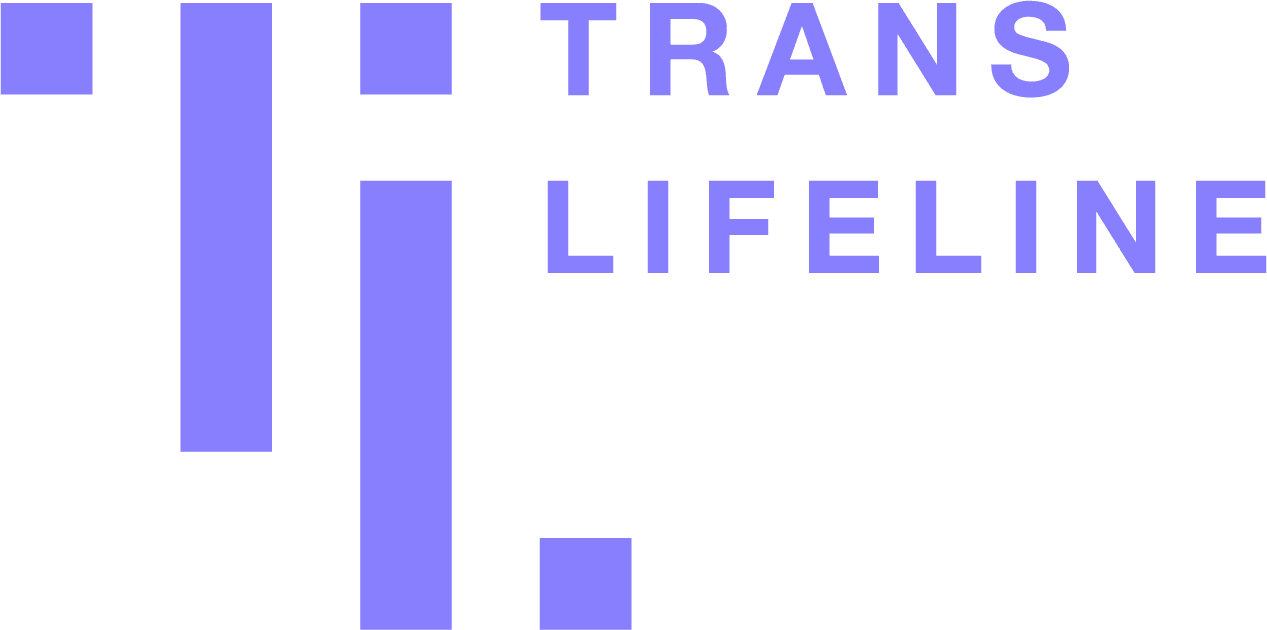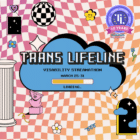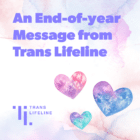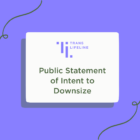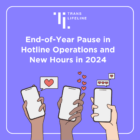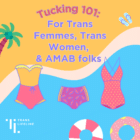Trans Lifeline’s Data During a Pandemic
Trans Lifeline’s Data During a Pandemic
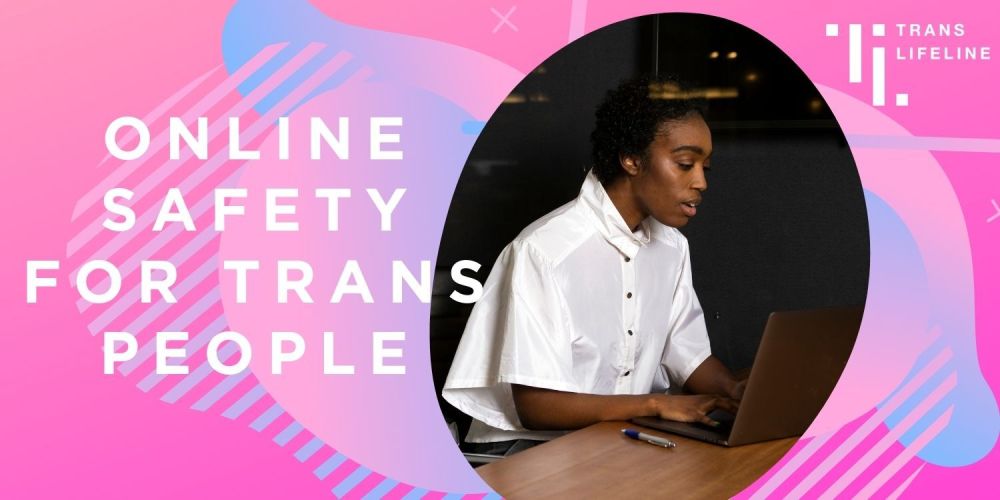
6/12/2020 by Oliver Stabbe
Oliver Stabbe (he/him) is a volunteer at Trans Lifeline, a trans-run organization offering emotional and financial support to trans people across the US and Canada.
As the COVID-19 pandemic unfolds, Trans Lifeline operators have been fielding an increasing number of calls. As we listen and support our community, our data tells a story of how the pandemic acutely exacerbates the barriers and challenges trans folks are forced to navigate. We explore some of those numbers here, and hear from Hotline Operators about their experiences on the line during the pandemic.
The current pandemic has hit the trans community hard: Calls about both COVID-19 and suicidal ideation have increased from the start of the pandemic by 89%.
While April is statistically the month with the highest rates of suicidality, operators saw a 67% increase in suicidal ideation this April compared to last year. So what is it about the pandemic that is contributing to this uptick in suicidal ideation? As one operator puts it: “A lot of people who were already struggling before the pandemic are now struggling to survive. If before the pandemic you were struggling to do well, now you’re struggling to be okay. If you were struggling to be okay, now you’re struggling to exist.” It has become clear that COVID-19 is not only exacerbating conditions, but exposing long-standing structural inequalities.
Many callers reach out to Trans Lifeline as a way of seeking help for long-term mental health struggles resulting from social, political, and economic marginalization. As chronic stressors and social upheaval around the pandemic amplify suicidal ideation, operators are recognizing that the pandemic is making mental health distress more acute, contributing to a 27% increase of callers in crisis compared to prior to the pandemic.
Despite needing medical treatment now more than ever, trans people can’t access care: Calls reporting inability to access medical treatment have doubled since the pandemic started.
Trans people already have had to jump hurdles to access necessary medical treatment of any kind even before the pandemic. Whether due to discrimination or lack of trans-competency, medical providers often fail to understand the needs of gender affirming care, require arbitrary tests, or pin unrelated health conditions on gender identity. Many trans people lack insurance or financial resources to pay for expensive treatments. Now, with the pandemic, callers are reporting having to postpone and cancel necessary gender affirming surgeries that they have been saving months or even years for. Worsening the situation, for those who are now unable to access gender affirming medical care, many are dealing with intense dysphoria that comes with staying at home without the same resources they were able to utilize prior to the pandemic. One operator comments, “It’s devastating. I think a big element about affirming procedures are being classified elective, even though they’re absolutely necessary for some trans folks to be able to live.”
The people around us matter: Calls about lack of community support are up 81% and calls about family rejection are up 47% as the pandemic goes on. There’s been an over 300% increase in the number of calls about intimate partner violence.
One of the key ways to combat depression and dysphoria is through community support and resources. As one operator explained, “Being able to connect with someone who understands the struggles of the community but also the universal struggles of being in the midst of a pandemic — without having to justify their existence when commiserating about really tough stuff is important. On the other hand, a lot of people have been calling in because they want to talk to someone who understands the joy of gender euphoria but don’t have someone to share that with. A great part of the community is being able to celebrate those moments of positivity and victory with others.”
For those stuck at home with unsupportive family members, particularly young people, the lack of community support and self-determination can be even more severe. Says one operator,
“One of the biggest differences in the calls now is that now stuck at home with unsupportive people or dealing with depression and can’t rely on the same resources. It’s like, ‘now I have no options and I’m literally calling from inside the closet.’ You can’t get away from unsupportive people and now there’s limited options ”
Because people are stuck at home, intimate partner violence calls have also skyrocketed. Because domestic violence shelters are usually gendered, they have a history of rejecting trans people.
Our safety is most compromised when basic needs aren’t met: Housing instability calls have increased by 300%, unemployment 400%, and underemployment 600% since the start of the pandemic.
The research is clear that in order to fight the spread of COVID-19, people need to stay and work from home, though this is not possible for many people. “A common sentiment that I’m hearing is that people are afraid, and honestly their fears are valid. We know that trans people are unemployed and homeless more often than cisgender people — losing income or homes are legitimate fears that plague our community,” says one operator. Economic justice and financial stability are key to our community’s health — especially for trans people of color, who deal with increased employment discrimination.
Operators report that due to schools closing down, many college students can’t go home to their families of origin or have made the impossible decision to face houselessness rather than to be quarantined with their families who would subject them to abuse. Many are struggling to find available beds in shelters and are being turned away based on their gender identity. When able to access shelters, “lots of people are having bad experiences because of their identity and are afraid to go back, or are afraid for their safety.” This also disproportionately impacts trans people of color.
Additionally, financial security is even more shaky. Compared to this time last year, operators are fielding 132% more job-related calls — even though last year many employment opportunities were taken from our community when the trans military ban was announced. One operator has heard common sentiments of fear from callers:
“How am I possibly going to find a job? And, if I don’t, will patchwork work history bar me from unemployment benefits? What if my documents don’t match? How will I navigate a bureaucracy that doesn’t recognize my identity?”
Our data is clear: COVID-19 isn’t creating new barriers for our community, but exacerbating already existing structural barriers to health.
Though scientific advances may result in a vaccine and a day without social distancing is on the horizon, our data tells us that when the pandemic is declared over, the public health emergency of transphobia will still remain.
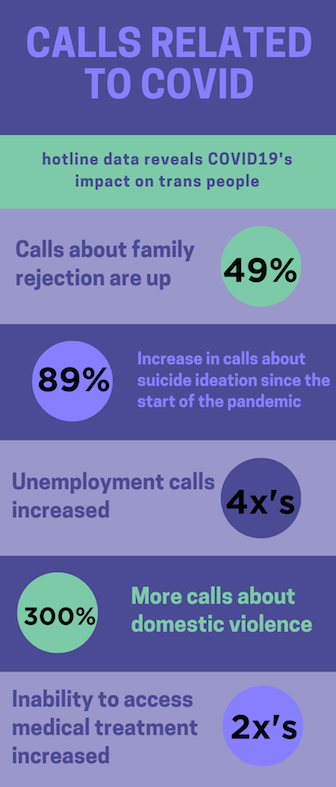
Recent
- Press Release: Trans Week of Visibility Streamathon

- An End-of-year Message from Trans Lifeline

- Navigating Change: Trans Lifeline Initiaties Restructure for Long-Term Resilience

- End-of-Year Pause in Hotline Operations & New Hours in 2024

- Tucking Guide for Trans Femmes, Trans Women & AMAB

